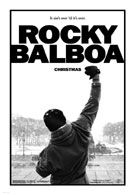Considering TBS or TNT offers a Rocky marathon practically once a month, it's hard to believe that it has been a full thirty years since the Oscar winning original, and 16 years since the embarrassment that was Rocky V. But Stallone, like his character, still has "stuff in the basement" and his unfinished business comes alive on screen with this season's underdog Rocky Balboa. I was expecting a Snakes on a Plane level of unintentional comedy, so you can imagine my disappointment when I only laughed with the characters which incidentally, was the only disappointing thing about the film. This holiday, Rocky Balboa may not be a box office knock out, but it certainly will last a few rounds.
The film brings us back to Rock's gritty hometown of South Philadelphia and dwells on the changes that have struck the title character and the city he loves since the saga began. The people are angrier, the old pet shop has closed down, the ice rink is now a parking lot, and most of all, the love of Rocky's life Adrian has died of cancer. Boxing too has changed from the "if he dies, he dies" days of Ivan Drago, to complete mediocrity and the current champion Mason "The Line" Dixon (Antonio Tarver) finds himself booed after his thirtieth uninspired knock-out.
Meanwhile, Rocky dwells in the past like a deranged stalker, filling his restaurant Adrian's with countless pictures of his wife, and taking walks by their favorite haunts. One such trip down memory lane brings him to a local pub where he meets the good natured Marie (Geraldine Hughes), who said "screw you creep" to Rocky in the first film, but might consider it literally after they reconnect. As Rocky grows closer to Marie and her African-American son Steps (James Francis Kelly III), he struggles to maintain a relationship with his own son Robert (Milo Ventimiglia), who has grown bitter at his father (probably because of all that gang fighting in Rocky V).
The film's nostalgic pace finally picks up when ESPN airs a computerized fight showing The Italian Stallion in his prime knocking out Mason Dixon. This piques Rock's curiosity, and he decides to apply for his fighter's license (Stallone conveniently pretends that the brain damage of Rocky V never happened.) Rocky considers some local competitions, but when Dixon's managers suggest a Pay-Per-View exhibition fight against the champ, Rocky takes to the steps of the Philidelphia Musuem of Art once more.
Rocky Balboa is all about the throwback; from the music, to the raw meat training sequence, to actual flashbacks from the other films, Stallone doesn't want you to forget what made the franchise a success in the first place. He manages to recreate the course realistic vibe of Rocky I, and brings back an emotional roundness to the character that certainly was missing in the later films. Here Rocky isn't a glorified legend, but a beat up old man who still shuffles when he walks and still address everyone with "Yo." He lives in a modest two story home, his friends are plain looking with thick Philly accents, and his son wants nothing to do with him. Rocky is the loveable underdog that moviegoers certainly will be able to get behind once more. While at times Sly looks like half his face melted off and his shoulder has some freaky vein action going on, you have to admire the man for looking credible at sixty. The film may have its share of cheesy moments, but by the time the trumpets of "Gonna Fly Now" blare, you can't help but silently chant "Rocky, Rocky!"
Stallone proves he can still write and act the part, but his work behind the camera leaves much to be desired. We can write the corny freeze frames off as a tribute, but Stallone must have gotten punched a little too hard in the head to think it was a good idea to pack every film technique possible in a five minute fight sequence. At random moments the fight turns into a scary Gatorade commercial, with everything fading to black and white except the blood from the fighter's lips. Then Stallone shifts to slo-mo, using corny dialogue and quick screen flashes to establish Rocky's inner monologue as if we can't figure out on our own that he is telling himself to "get up!" Stallone presents the entire fight as if you are really watching pay-per-view, which works relatively well but like the other glitzy techniques, distracts from the meat of the scene.
Ultimately, Rocky Balboa is so wonderfully self-aware that you can't help but respect Stallone for putting it out there. Just as the film's hero was considered a joke for wanting to compete, Stallone was considered foolish for trying to resurrect a dead franchise and lines like "It don't matter how this looks to other people -- all that matters is how it looks to you" are obviously meant to address that. If nothing else, Stallone proves the film's motto; "the last thing to age on somebody is their heart," and Sly puts his heart into this project, droopy face and all.
Most Popular




